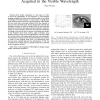Free Online Productivity Tools
i2Speak
i2Symbol
i2OCR
iTex2Img
iWeb2Print
iWeb2Shot
i2Type
iPdf2Split
iPdf2Merge
i2Bopomofo
i2Arabic
i2Style
i2Image
i2PDF
iLatex2Rtf
Sci2ools
123
click to vote
TIFS
2011
2011
Quality Assessment of Degraded Iris Images Acquired in the Visible Wavelength
—Data quality assessment is a key issue, in order to broad the applicability of iris biometrics to unconstrained imaging conditions. Previous research efforts sought to use visible wavelength (VW) light imagery to acquire data at significantly larger distances than usual and on moving subjects, which makes this real world data notoriously different from the acquired in the near infra-red (NIR) setup. Having empirically observed that published strategies to assess iris image quality do not handle the specificity of such data, this paper proposes a method to assess the quality of VW iris samples captured in unconstrained conditions, according to the factors that are known to determine the quality of iris biometric data: focus, motion, angle, occlusions, area, pupillary dilation and levels of iris pigmentation. The key insight is to use the output of the segmentation phase in each assessment, which permits to handle severely degraded samples that are likely to result of such imaging s...
| Added | 15 May 2011 |
| Updated | 15 May 2011 |
| Type | Journal |
| Year | 2011 |
| Where | TIFS |
| Authors | Hugo Proença |
Comments (0)

